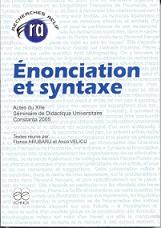Développement et évolution des temps du passé en français : Passé simple, passé composé et venir de + infinitif
Development and evolution of past tenses in French: « passé simple », « passé composé » and venir de + infinitive
Author(s): Carl VettersSubject(s): Language and Literature Studies
Published by: Editura Echinox
Keywords: -
Summary/Abstract: This article is an application of the Bybee, Perkins & Pagliuca grammaticalization approach to the French past tenses which follow the ‘anterior to past’ path of development. The passé simple is the oldest gram on this path. It developed out of the Latin perfect but lost its anterior uses during the Middle Ages. Nowadays, it has disappeared from spoken language and is considered as a “dying” gram. The birth of the passé composé can be situated in low Latin. In the beginning it has resultative and anterior readings. Starting from the Middle Ages, a past tense reading develops. The 17th and 18th centuries – French Classical Age – are crucial for this development. By the end of the 18th century, the passé compose has become a real past tense, as show verb-adverb correlations. Nevertheless, unlike the passé simple, it maintained its anterior reading and, with the auxiliary être, it even conserved several ancient resultative readings. The last gram on this path of development (and the most recent of the three) is the verbal periphrasis venir de + infinitive, which joins temporal proximity to the anterior and past significance. As for the other two grams, the anterior reading, which appears during the Middle Ages, is older than the past tense reading, for which we found examples in 19th century literature.
Journal: Recherches ACLIF: Actes du Séminaire de Didactique Universitaire
- Issue Year: 2006
- Issue No: 03
- Page Range: 319-340
- Page Count: 22
- Language: French

